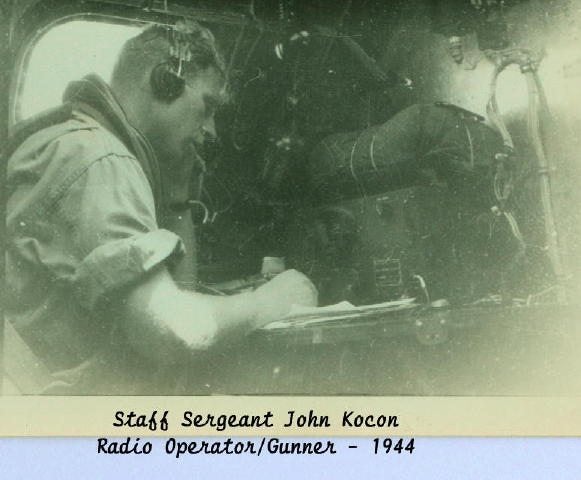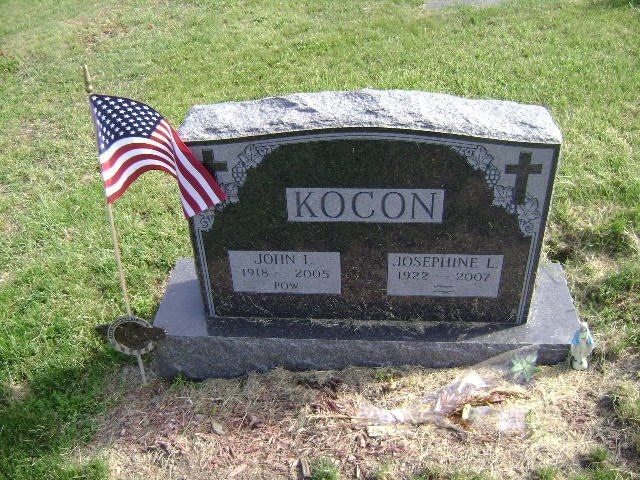John L. KOCON
S/Sgt, US Army Air Forces
Service N°: 13040178
Bomb Group: 92
Bomber Squadron: 407
Entered Service: 29 December 1941
Hometown: Lower Burrell
Born: 21 January 1918 Barnesboro, Cambria County
Died: 25 December 2005 in Veterans Administration Hospital, Aspinwall
Burried at: St. Mary Catholic Cemetery, Lower Burrell, Westmoreland County Lower, PA
Find a Grave: http://www.findagrave.com/cgi-bin/fg.cgi?page=gr&GRid=19168654
Awards:
POW: capured just after landing
Stalag Luft 4
Gross Tychow, formely Heydeburg



Picture from Find a Grave Rick Fedouch
Registration Card:
Capture report
German interrogation report (translated)
My questionnaire


Letter from Kocon to Cook:
"I bailed out of a B-17 July 20, 1944 over enemy territory. When I parachuted down, I hit the ground off-balance, the backside of my ribs smashed into my right hip and immediately it snapped my back. I had severe pain in my back, on my right side and down my legs. Immediately I hid under the underbrush to try to evade the Germans soldiers coming towards me. But the Germans had police dogs and it wasn't long before the dogs got my scent and I was captured. The German soldiers soon found Lt. Stein and Lt. Kennedy of the B-17 bomb crew I was with. When the German soldiers captured me they inquired if I was a gangster and if I hailed from Chicago. Lt. Stein broke both his legs when he bailed out of the B-17. I and about 50 captured U.S. airmen were marched through some of the German cities with our flying suits on, the German civilians threatened to kill us and threw stone and bottles at us. Give credit to the German soldiers - they prevented the mob of civilians from attacking the American airmen. Lt. Kennedy and I were taken to the Oberursel interrogation camp near Frankfurt, Germany where we were placed in solitary confinement for one week. We had very little food or water while in solitary confinement. The German interrogator kept stating I was a spy even after I presented my dog tag to him. I was then transported via train to my permanent camp, Stalag Luft IV at Kiethiede, near Stettin, Poland. As we rode on the train and approached our permanent camp, an English-speaking German soldier warned us not to retaliate in any way if we were beaten for it would be fatal. We departed from the train and approximately fifty U.S. airmen were kept standing at attention. One airman, who had both legs off at the knee, waited on the platform with us. Two German soldiers grabbed the helpless U.S. airman with his legs shot off and threw him like a sack of potatoes to the ground from a height of four feet. I don't know what happened to the U.S. airman. I never saw him again. We wondered what to anticipated after that horrible and inhumane act of terror. The German soldiers screamed "Run you swine; run you dog." They ran on both sides of the column and were continuously beating me and the other U.S. airmen with the butt of their rifles. If an airman fell to the ground or could not continue this fanatical run, he was bayonetted. The German soldiers also had German police dogs that would bit and maul you. This brutal attack lasted approximately four miles. Every mile or so, a new, fresh group of German soldiers would continue the brutal attack. The pain in my right side and in my back was horrible. I don't know where I got the strength and fortitude to continue this fanatical run. With all my back trouble and to my amazement, one U.S. airman grabbed my flight jacket and I pulled him into the prison camp the last mile of the run. This airman held onto my flight jacket for dear life as he knew if he staggered to the ground he would be bayonetted. This was my good deed during the attack by the German soldiers. I must say that I had to be in good condition, physically, to pull this airman into the prison camp. As I ran I visualized the Germans running the airmen until we all would be killed.
We arrived at the prison camp after this brutal, senseless attack and we had to stand at attention for many hours. If an airman could not stand at attention, you got pistol-whipped about the face. The Germans ordered all the airmen to strip naked and they searched you. Your compass, wrist watch, money, and anything of value was confiscated. The Germans continued to beat you and rough you up. We arrived at Stalag Luft IV Kiefhiede in the middle of August 1944. I slept on the ground in a tent for two months in compound A. As winter was approaching, I was moved to compound C into a barracks where we slept on the floor. The food at Stalag Luft IV was very insufficient. Here is a typical day for food at the prison camp. Breakfast-you received no food. For lunch you received a slice of bread. For supper you received a cup of watery soup. The food situation was getting worse because we argued that some U.S. airmen were getting bigger portions that others. We are now licking our bowl dry with our tongues. This was a starvation diet. In the meantime, the Germans were always threatening the airmen. Conditions at Stalag Luft IV were horrible, health care nonexistent. I went on sick call once for the terrible pain in my back and was asked if I was passing blood. When I said, "No," the doctor sent me back to the compound with a stern warning not to come on sick call again or else I would be punished. The most frightening thing, though, was the hunger, hunger. About February 1, 1945 as the Russian offensive approached, our prison camp was disbanded. We started a miserable forced march of approximately 500 miles across and around Germany. The weather was extremely frigid and snowing. We marched fifteen to twenty miles a day. We slept on the ground or, if we were lucky, in barns at night. To compound matters, we had lice and filth over our entire body. When we slept in barns at night, I usually stole raw potatoes, pig mash and oats. This is how I survived on this forced march. Without adequate food and health conditions, many U.S. airmen just gave up, suffered and died. The forced march lasted three and a half months. Once we were put into cattle cars where we spent a week being transported. We had no food or water during this time. At this stage we all had dysentery and diarrhea and the stench was unbearable in the cattle cars. One day while on the forced march, we slept in a barn on a farm. I was able to contact a Polish slave laborer at the farm and I asked him if I escaped from the Nazis would he help me. He offered to assist. The next day as we started to march, a friend and I escaped and the Polish laborer was waiting for us in the woods nearby. He took us to his small home where he harbored, gave us some food and hid us in the attic. We had been hiding in the Polish home about two weeks when the English army attacked and we were liberated at last around May 15, 1945. The Polish family that helped me escape were also freed. My thoughts at the time of liberation? I was elated and joyous that I had my freedom. I was most happy that I could again eat food that I was deprived of for so long. I probably lost fifty pounds during my prison internment. My thoughts were also with the American families that lost their sons, husbands and brothers in Germany. I've spoken to many U.S. airmen at the prison camp and I've heard many horrible stories about airmen being captured and shot to death. Many were captured, doused with gasoline and set afire. Some were chained behind a truck and dragged until they were dead. And I saw the death camps where the Nazis tortured, starved and murdered the Jews, Gypsies and untold numbers of other people. The sight of seeing all the dead bodies was horrifying and pitiful. After my liberation I was flown to Camp Lucky Strike in France where we were fed an enormous amount of food to gain weight. This was a terrible ordeal for me, Jetty, and if any good has come out of this, it is that I appreciated life and I appreciate food and my freedom."



